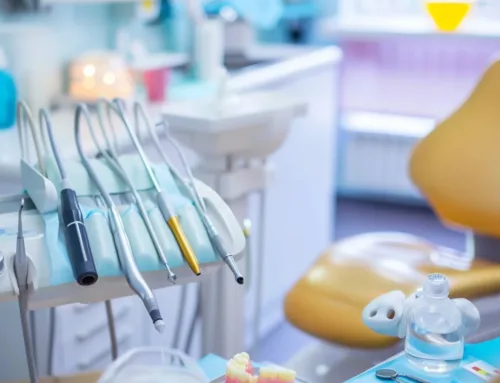5 Habits for Kids to Prevent Cavities & Keep Teeth Strong
Protecting teeth against the harmful effects of tooth decay is one of the most important parts of a regular oral health care routine. For children in particular, warding off cavities and keeping their teeth healthy and strong is vital in their growth and development. Teaching kids about cavities and tooth decay, and encouraging a regular routine of preventive oral care habits will protect their teeth and keep their smiles looking beautiful.
From a very young age, kids need to be made aware that taking good care of their teeth is an important part of staying healthy. It’s commonly known that cavities are a big problem for children, but sometimes even the parents aren’t entirely informed on what the best approach to cavity prevention is for their kids. After all, there can be a lot of conflicting information and differences of opinions out there. Here, we will give parents the facts on tooth decay, explain the risks of cavities in children, and provide helpful tips to protect your kids teeth the right way.
To get started, let’s take a moment and get to the root of the problem of cavities by explaining what they are and what causes them to form.
What Is Tooth Decay, and What Causes Cavities to Form in Teeth?
Teeth consist of multiple layers of organic material. These layers include the soft inner pulp where the nerve endings are found, the firm dentin that gives the tooth its structure, and the ultra-hard outer shell of enamel that gives teeth their shiny white appearance. While the enamel is extremely durable, it is not completely impervious. Over time, if the enamel is not kept clean and strong, it can start to degrade.
As we eat and drink, saliva gets mixed with the chewed up material and starts the process of digestion. This creates an environment in the mouth in which bacteria can grow and accumulate. This bacteria gets deposited on the teeth and around the gums, and will eventually create a sticky film known as plaque. Plaque is a breeding ground for oral bacteria, and as these bacteria multiply they produce acidic by-products. It is this acid that has a caustic effect on the enamel of the teeth, gradually eroding and weakening this protective barrier on the outside of the teeth.
As the acid wears on the enamel, it will eventually create indentations in areas where the acid is in greatest concentration or has been in contact most frequently. These indentations are known as cavities, and if left untreated they can wear right through the enamel entirely and start to affect the dentin and inner pulp of the tooth. The effects of cavities and tooth decay can vary from mild discomfort to intense pain and swelling. Infections can form due to the build-up of bacteria in the gums, around the root of the tooth, or even inside the tooth itself.
As you can see, tooth decay is a serious issue. Prevention is key to avoiding the problems associated with cavities, and early treatment of cavities before they can grow larger will help reverse the effects and restore the teeth back to good health.
How Are Cavities Treated?
For situations where a cavity has not yet progressed to the point where it can accept a filling, but there are warning signs of tooth decay, the patient will likely receive fluoride treatments to reinforce the strength of the tooth enamel. These fluoride treatments are usually part of a child’s regular dental care, and are available in pleasing flavours that kids can choose from like mint, citrus, and fruits like cherry or strawberry. In addition, tooth sealants may be recommended to provide an extra layer of protection on the teeth, particularly in patients who appear to be more prone to cavities.
In most cases where the cavities are small, a simple filling will be all that is required to halt the progression. Many types of small cavities can be filled in and repaired quite quickly and easily, sometimes without even the need for any anesthetic or freezing. The dentist will begin with a thorough tooth cleaning, and may sand or grind the area of the cavity to remove any weak tooth material and provide the strongest bond for the filling. The filling itself consists of a dental amalgam material that can be molded to completely fill in any shape of cavity. Once in place, the amalgam filling is then hardened using a special curing light. Finally, the filling is then smoothed and shaped to remove any high spots that may affect the bite pattern, leaving the patient with a completely restored tooth.
In severe cases of tooth decay where the cavities are large and deep, the tooth may need to be extracted if the damage is too extensive to repair. For children, if the cavity is in a baby tooth, this may not be overly concerning in the long term as the tooth would eventually fall out anyway. However, the decayed tooth should certainly not be ignored or left in place to fall out on its own, as the risks of infection or other complications are too high.
In cases where advanced decay is located in a permanent tooth and it must be extracted, additional treatment will likely be recommended. This usually means the patient will receive a dental implant to replace the lost permanent tooth. For kids, the replacement of a permanent tooth may not be suggested until after the natural development of the mouth and jaw has progressed further. Once the child has matured a bit more, the dentist will plan for the best time to have the implant procedure performed if necessary.
Why Do Children Seem to Be More Likely to Get Cavities?
Everyone is at risk of developing cavities if they don’t take proper care of their teeth, but it does seem that children have a higher likelihood of experiencing tooth decay. This is due to a number of contributing factors. First, children are still in the process of learning how to brush and floss their teeth properly, which are skills that even many adults don’t always use properly. This means that kids aren’t always getting their teeth 100% clean each time, leading to a higher chance of plaque to form and bacteria to grow in the hard-to-reach spaces of their mouths. Usually things improve as the child grows and learns better techniques for brushing and flossing.
In addition, diet and nutrition can also play a role in cavity risk. Kids who enjoy frequent sugary snacks and drinks are creating a more acidic environment in their mouths, which increases the effects that cause decay of tooth enamel. The digestion of sugars and carbohydrates raises the acidity level in the mouth, so eating these foods in moderation can help to lessen the risks of cavities. Maintaining a healthy and balanced diet is essential for proper development of the entire body, so it’s not just the smile that will benefit from an improvement to daily nutrition.
Susceptibility to tooth decay can also be related to genetic factors. If the family has a history of frequent cavities, there’s a greater likelihood that the child will also be prone to develop cavities. Certain medications can also have an influence on the acidity in the mouth and the risks of tooth decay. To find out more about these side effects, it’s best to consult your family doctor to get specific details.
With these points in mind, we now come to a series of sensible tips and healthy habits that parents and kids can use together in order to protect teeth against cavities, fight back against tooth decay, and keep teeth strong and resilient.
Top 5 Cavity-Fighting Oral Care Habits for Kids
Cavity Prevention Tip #1 – Brush the Teeth with Proper Technique
Stopping cavities in their tracks all starts with the right toothbrushing technique, and a good quality fluoride toothpaste. Kids should be encouraged to help pick out their own soft-bristled toothbrush & toothpaste flavour, with a little guidance from your dentist on the recommended brands and styles that are best for children. Kids are much more likely to want to brush if they have some input on the products they use, particularly if the packaging features their favourite characters!
Then, with the supplies you need, teach them how to properly brush their teeth. Use gentle pressure and rhythmic motion, make sure to cover all the teeth from top to bottom and front to back, and brush for the optimum duration of two minutes. Here’s a fun and interactive video that is perfect to show kids on how to properly brush their teeth, explained in simple terms that they will definitely understand with colourful, attention-keeping animation.
Cavity Prevention Tip #2 – Floss in Between the Teeth Daily
One of the most common places for cavities to form is in between the teeth, where it can be difficult for a toothbrush to reach. To get into these difficult spots and remove plaque and food remnants, floss is needed. Teaching your kids to floss early in life will help instill this healthy habit and make it far easier to keep up with it as they grow up. This is another kind of product where you can get the kids involved to pick out a special floss that’s their very own, helping to make it more appealing for them to use it. In addition to traditional satin floss, there are also other interdental cleaning products that can be used including picks, tape, and water flossers.
Cavity Prevention Tip #3 – Avoid Foods High in Sugar
In addition to keeping up with daily dental cleaning habits, another effective cavity fighting method is to make some healthy changes to the foods kids eat throughout the day. This isn’t to say that candy and sugar needs to be cut out entirely, but there are plenty of ways to shift your child’s snacking routine over to healthier options. To make it even easier to cut out sugar, but still offer the fun treats that kids love, there are all kinds of sugar-free versions of things like gummy snacks, hard candies, sodas, and chocolates. Get your kids involved in choosing their snacks, offering healthier options and getting them thinking about how to balance fun treats with healthy foods in their daily lives.
Cavity Prevention Tip #4 – Drink Plenty of Water
Drinking more water each day is something we all should be working on, as it’s one of the simplest and most effective ways to promote good health. When it comes to cavity prevention in kids, water can be a great benefit. In addition to giving your body the necessary hydration it needs to keep functioning at peak performance, it also helps to wash away some of the acids and bacteria in the mouth with each gulp. This rinsing action helps to slow down bacterial growth in the mouth and reduce the amount of enamel-harming acid that’s in contact with their teeth. Over time, these effects can really add up to reduction in the risk of cavities for kids. Encourage kids to regularly choose water as a beverage, and try to always have a refillable water bottle nearby for them that you can take to the park, in the car on long trips, and everywhere else when the inevitable call of “I’m thirsty” comes.
Cavity Prevention Tip #5 – Stay on Track with Dentist Checkups
Last, but certainly not least, is the importance of sticking to the recommended schedule of dental checkups. Reinforcing to kids that their dentist and hygienist are there to help keep their smiles healthy and their teeth strong from the very beginning can go a long way. Regular fluoride treatments will bolster the strength of your child’s tooth enamel and increase its resistance to decay. Cleaning and polishing will remove stuck-on plaque and tartar, removing those bacterial deposits that are responsible for many types of dental issues, including cavities.
Prepare Kids for a Lifetime of Beautiful Smiles with Effective Cavity Prevention
At the end of the day, it’s all about taking good care of kids when they’re young so that they have the habits and knowledge they need to take care of themselves when they grow up. Good dental care routines and regular dentist check ups are the absolute best ways to keep cavities away and stop tooth decay before it starts. If someone in your family is in need of a tooth cleaning and dental checkup, get in touch with the team here at Georgian Dental today. We will be glad to schedule an appointment at your convenience. We can’t wait to help your kids stay cavity-free!
Appointment Request
If you’re interested in any of our procedures, and would like to meet with one of our dentists to discuss options, costs and get additional information, complete this short form and we’ll give you a call to arrange for a no-obligation appointment at our Barrie clinic.










